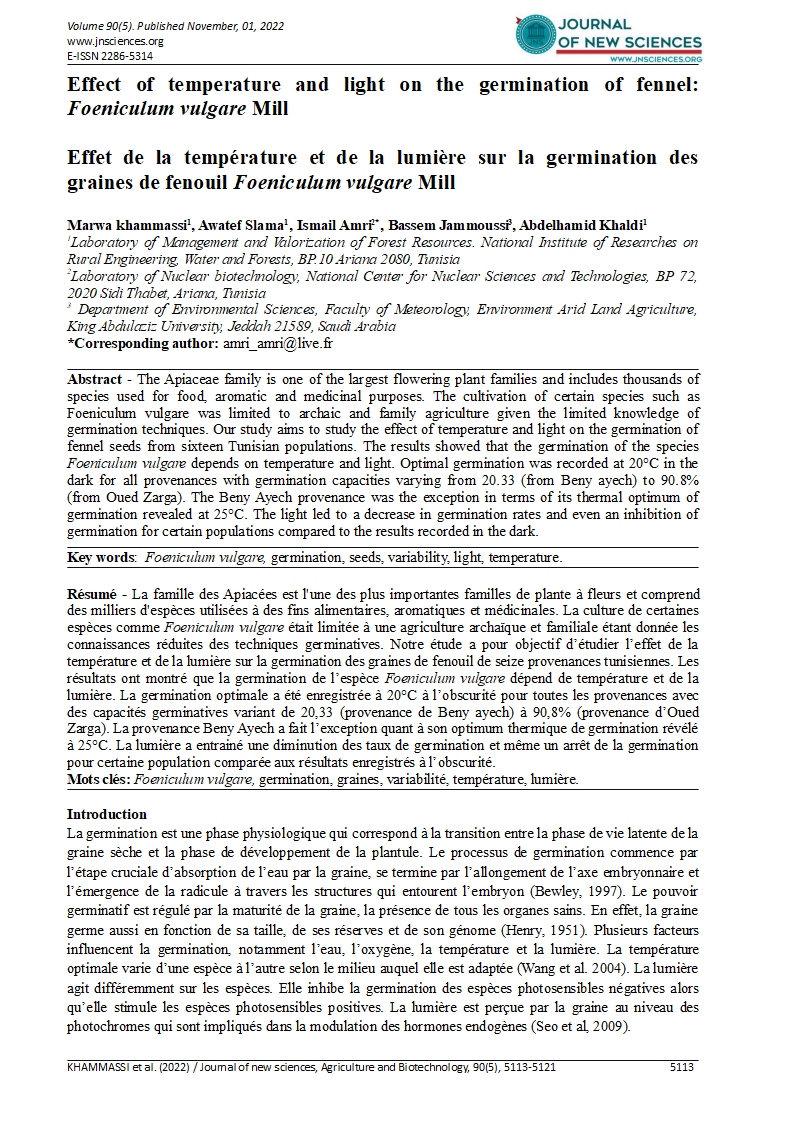

- Category: Volume 90
- Hits: 1224
Effect of temperature and light on the germination of fennel: Foeniculum vulgare Mill
Effet de la température et de la lumière sur la germination des graines de fenouil Foeniculum vulgare Mill
Marwa khammassi1
Awatef Slama1
Ismail Amri2
Bassem Jammoussi3
Abdelhamid Khaldi1
1Laboratory of Management and Valorization of Forest Resources. National Institute of Researches on Rural Engineering, Water and Forests, BP.10 Ariana 2080, Tunisia
2Laboratory of Nuclear biotechnology, National Center for Nuclear Sciences and Technologies, BP 72, 2020 Sidi Thabet, Ariana, Tunisia
3 Department of Environmental Sciences, Faculty of Meteorology, Environment Arid Land Agriculture, King Abdulaziz University, Jeddah 21589, Saudi Arabia
DOI: https://doi.org/10.55416/sunb.jns01.2211.09005
Abstract - The Apiaceae family is one of the largest flowering plant families and includes thousands of species used for food, aromatic and medicinal purposes. The cultivation of certain species such as Foeniculum vulgare was limited to archaic and family agriculture given the limited knowledge of germination techniques. Our study aims to study the effect of temperature and light on the germination of fennel seeds from sixteen Tunisian populations. The results showed that the germination of the species Foeniculum vulgare depends on temperature and light. Optimal germination was recorded at 20°C in the dark for all provenances with germination capacities varying from 20.33 (from Beny ayech) to 90.8% (from Oued Zarga). The Beny Ayech provenance was the exception in terms of its thermal optimum of germination revealed at 25°C. The light led to a decrease in germination rates and even an inhibition of germination for certain populations compared to the results recorded in the dark.
Key words: Foeniculum vulgare, germination, seeds, variability, light, temperature
Résumé - La famille des Apiacées est l'une des plus importantes familles de plante à fleurs et comprend des milliers d'espèces utilisées à des fins alimentaires, aromatiques et médicinales. La culture de certaines espèces comme Foeniculum vulgare était limitée à une agriculture archaïque et familiale étant donnée les connaissances réduites des techniques germinatives. Notre étude a pour objectif d’étudier l’effet de la température et de la lumière sur la germination des graines de fenouil de seize provenances tunisiennes. Les résultats ont montré que la germination de l’espèce Foeniculum vulgare dépend de température et de la lumière. La germination optimale a été enregistrée à 20°C à l’obscurité pour toutes les provenances avec des capacités germinatives variant de 20,33 (provenance de Beny ayech) à 90,8% (provenance d’Oued Zarga). La provenance Beny Ayech a fait l’exception quant à son optimum thermique de germination révélé à 25°C. La lumière a entrainé une diminution des taux de germination et même un arrêt de la germination pour certaine population comparée aux résultats enregistrés à l’obscurité.
Mots clés: Foeniculum vulgare, germination, graines, variabilité, température, lumière.

